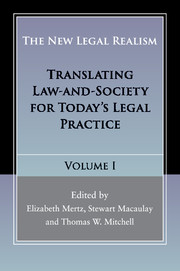Book contents
- Frontmatter
- Contents
- List of contributors
- Preface to The New Legal Realism, Volumes I and II
- 1 Introduction: New Legal Realism: Law and Social Science in the New Millennium
- Section I THE PLACE OF NEW LEGAL REALISM IN LEGAL THOUGHT AND TEACHING
- Section II PHILOSOPHY AND METHODS FOR A NEW LEGAL REALISM
- Section III NEW LEGAL REALIST TRANSLATIONS
- 10 New Legal Realism and Inequality
- 11 The Financial Crisis and Moral Accountability: Translating Practices of Risk, Profit, and Uncertainty
- 12 The Moment of Possibles: Some New Legal Realism about a “Reality Thriller” Case
- 13 Translating Law across Cultures and Societies: A Conversation with David Bellos and Kim Lane Scheppele
- 14 Is There a Lingua Franca for the American Legal Academy?
- Index
- References
14 - Is There a Lingua Franca for the American Legal Academy?
from Section III - NEW LEGAL REALIST TRANSLATIONS
Published online by Cambridge University Press: 05 May 2016
- Frontmatter
- Contents
- List of contributors
- Preface to The New Legal Realism, Volumes I and II
- 1 Introduction: New Legal Realism: Law and Social Science in the New Millennium
- Section I THE PLACE OF NEW LEGAL REALISM IN LEGAL THOUGHT AND TEACHING
- Section II PHILOSOPHY AND METHODS FOR A NEW LEGAL REALISM
- Section III NEW LEGAL REALIST TRANSLATIONS
- 10 New Legal Realism and Inequality
- 11 The Financial Crisis and Moral Accountability: Translating Practices of Risk, Profit, and Uncertainty
- 12 The Moment of Possibles: Some New Legal Realism about a “Reality Thriller” Case
- 13 Translating Law across Cultures and Societies: A Conversation with David Bellos and Kim Lane Scheppele
- 14 Is There a Lingua Franca for the American Legal Academy?
- Index
- References
Summary
This chapter, more of a rant or a meditation than a conventional work of scholarship, presses hard the idea of translation between languages within the legal academy, asking, not only about a lingua franca, but also about a vernacular. It begins, as it will continue, with personal anecdote, not with data, and this in itself should help the reader to situate the author vis-à-vis some of the languages herein discussed.
I have been teaching for the last decade and a half at the University of Chicago Law School, which has long had a deserved reputation, not only for welcoming conservative scholars and for favoring a somewhat macho scholarly style, but as a center of law and economics scholarship. When the University of Chicago recruited me in the late 1990s, I expressed concerns about the lack of diversity among the law school faculty. My chief concern was not diversity of political persuasions: I was, after all, contemplating a move from the more conservative University of Virginia law faculty to a faculty in which, notwithstanding the prominence of conservatives, I would no longer occupy the left fringe but fall somewhere in the middle of a broader left-right spectrum. Nor was it demographic diversity, although I would have been delighted to see more women and people of color on the Chicago faculty. I did note with some regret a lack of temperamental or stylistic diversity, but I wondered whether this was easily curable given the small size of the Chicago faculty and the focus on a single conversation at the faculty's thrice weekly Roundtable lunches. Would someone who not only was uncomfortable bluntly criticizing or interrupting others, but might actually want to think something carefully through before speaking about, it ever be able to get a word in edgewise? I doubted it.
What I told the hiring committee I was most worried about was a lack of methodological diversity. I did not mean by this a lack of subject-matter diversity; rather what I was looking for, even in those subject areas dominated by law and economics discourse, such as the first-year private law topics of contracts and torts, was a broader diversity of ways of thinking and talking about law.
- Type
- Chapter
- Information
- The New Legal RealismTranslating Law-and-Society for Today's Legal Practice, pp. 289 - 297Publisher: Cambridge University PressPrint publication year: 2016
References
- 27
- Cited by



